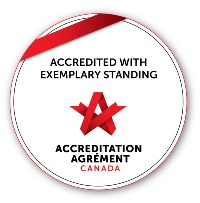CervixCheck Information for Healthcare Providers
Most people who have a cervix, are aged 21-69, have ever had sexual contact, should be screened for cervical cancer every 3 years.
See the CervixCheck Screening Guidelines (pdf) for more detail.
HPV test of cure results indicate if a high-risk HPV infection has been successfully treated and cleared, and is considered when assessing ongoing patient management.
Current CervixCheck Screening Guidelines (pdf) and routine screening following discharge from colposcopy remain unchanged.
On March 26, 2025 from 8:00am-9:00am join Dr. Sarah Kean, Medical Lead, CervixCheck, CancerCare Manitoba, in an interactive presentation on the assessment and treatment of abnormal cytology and learn how the newly implemented HPV test of cure will benefit your patients. Click here to register.
Provider Resources
Cervical Cancer Screening Learning Module for Healthcare Providers
Colposcopy Services in Manitoba (pdf)
Clinical Practice Change - Implementation of HPV triage for cervical cancer screening (pdf) effective March 14, 2022
HPV Triage: Information for Healthcare Providers (pdf)
Pap Test Procedure: Liquid Based Cytology (LBC) (pdf)
HPV FAQ (pdf)
FAQ (pdf)
Clinic Resources
Patient Resources:
What you need to know to prevent cervical cancer (pdf)
Cervical cancer screening results(pdf)
HPV: Frequently asked questions – English (pdf)
HPV: Frequently asked questions - French (pdf)
Human Papillomavirus Manitoba Public Health Fact Sheet - English (pdf)
Human Papillomavirus Manitoba Public Health Fact Sheet - French (pdf)
Forms
Request for Cervical Cancer Screening Histories (pdf)
Cervical Cytology Request (pdf)
CervixCheck Provider Number Request (pdf)
Cervical Cancer Screening Clinic Registration
Colposcopy Report (pdf)
The results from cervical cancer screening are reported by the laboratory to the healthcare provider who collected the sample. The report will include:
- Specimen adequacy (satisfactory or unsatisfactory)
- High-risk human papilloma virus (hrHPV) result, if applicable
- Screening recommendations in alignment with the CervixCheck Screening Guidelines (pdf)
- Educational note
Healthcare providers are responsible for reporting all cervical cancer screening test results to their patients, and managing the required follow-up after an abnormal result. Follow-up can include making a referral to a colposcopy clinic or repeating the Pap test.
Colposcopy Services in Manitoba
Colposcopy has been used for several decades to identify sub-clinical abnormalities of the cervix. The cervix is magnified through a binocular scope with a high intensity light. Colposcopy referrals are required in patients with:
- a visually abnormal cervix.
- persistent low-grade results.
- a high-grade cytology interpretation.
- a high-risk human papilloma virus (hrHPV) result.
- persistent unsatisfactory results due to obscuring blood or inflammation.
Abnormalities of the cervix are identified based on:
- Epithelial density (white epithelium)
- Vascular patterns (punctation, etc.)
Using these parameters, an area of abnormality can be identified to direct a tissue biopsy.
If a high-grade lesion is identified involving the cervix, it can be treated in a separate appointment with one of the following methods:
- Laser surgery (uses an intense, narrow beam of light to remove abnormal cells),
- LEEP (loop electro surgical excision procedure; an electrical wire loop is inserted into the vagina where abnormal tissue is removed), or
- Cone biopsy (the removal of a cone-shaped piece of tissue).
An HPV test of cure may be done post-treatment to determine if the patient can be discharged from colposcopy to routine screening. If patients have a history of high-grade histopathology, they will still require an annual screen once discharged from colposcopy. If patients do not have a history of high-grade histopathology or other increased risk factors, they will still require screening every three years.
Colposcopy referrals should include:
- patient demographic information
- referring provider information
- reason for referral
- lab report for the most recent Pap test indicating colposcopy is needed
- CervixCheck screening history – Complete histories can be obtained from CervixCheck using the Cervical Cancer Screening History Request form (pdf).
See the Colposcopy Services in Manitoba (pdf) for a list of colposcopists to whom you can refer.
Resources to support result delivery and management:
- CervixCheck Screening Guidelines (pdf)
- Chapter 10 Cervical Cancer Screening Test Results (pdf) from the Cervical Cancer Screening Learning Module for Health Care Providers
- Cervical cancer screening test result brochure* English/French (pdf) - This resource can be ordered from our resources page.
- HPV: Frequently asked questions – English (pdf)
- HPV: Frequently asked questions - French (pdf)
People with a cervix, a neo-cervix, or removal of a cervix with a history of high-grade dysplasia, between the ages of 21-69 who have had sexual contact. Sexual contact refers to:
- skin-to-skin genital to oral, genital, or anal, or
- sex with shared sex toys.
A neo-cervix can be created during bottom surgery (vaginoplasty).
For more information, see chapter 3 of the Cervical Cancer Screening Learning Module (pdf).

The Cervical Cancer Screening Learning Module for Healthcare Providers is for those seeking to:
- initiate learning about cervical cancer screening and competency to perform Pap tests,
- mentor colleagues to become competent in screening for cervical cancer, and/or
- review current research, details and techniques about cervical cancer screening in Manitoba
To view the entire module click here (pdf) or click the individual chapter below:
Legal Disclaimer & Terms of Use (pdf)
Table of Contents (pdf)
Chapter 1 Introduction (pdf)
Pre-Test (pdf)
Chapter 2 Disease Burden & Cervical Cancer Screening in Manitoba (pdf)
Chapter 3 Cervical Cancer Screening Guidelines (pdf)
Chapter 4 Counselling & Education (pdf)
Chapter 5 Facilitating an Inclusive Environment (pdf)
Chapter 6 Physiology, Anatomy, Abnormal Findings (pdf)
Chapter 7 Health History (pdf)
Chapter 8 External & Speculum Exam (pdf)
Chapter 9 The Papanicolaou Test
Chapter 10 Cervical Cancer Screening Test Results (pdf)
Chapter 11 New Technologies (pdf)
Chapter 12 Cervical Cancer Screening Access (pdf)
Post-Test (pdf)
Glossary (pdf)
Appendix 1 Education (pdf)
Appendix 2 Forms (pdf)
Appendix 3 Assessment Tools (pdf)
Appendix 4 Case Studies (pdf)
Accompanying videos
SurePath LBC collection video
ThinPrep LBC collection video
Cervical cancer screening specimen collection video
To request the Cervical Cancer Screening Specimen Collection video, email us at [email protected]
At your cervix: What's normal anyways? video
To view this video, you will need to have an account with YouTube. Link to video: https://youtu.be/COL76Img-NM
CervixCheck partners with health care providers across Manitoba to offer increased access to cervical cancer screening. Clinics may offer service by appointment, walk-in, or both, and are encouraged to do so as frequently as their resources allow.
By registering your Cervical Cancer Screening Clinic with CervixCheck, your clinic's cervical cancer screening services will be listed on our website. Your cervical cancer screening clinic helps increase cervical cancer screening access for eligible Manitobans. To view a list of our current partner clinics, click here to access our Pap test clinic map.
To support your clinic, we have a variety of resources for download/order. To view a complete list of resources, click here.
Cervical cancer screening clinic posters (editable) - English/French (pdf)
Pap Test Procedure (pdf)
HPV FAQ (pdf)
The following outlines patient characteristics that warrant increased surveillance and provides management recommendations for each of these characteristics.
Recent abnormal Pap test result
Follow up as per the CervixCheck Screening Guidelines “Management of Results”
Previous high-grade cervical pathology result (greater than or equal to HSIL/CIN2/moderate dysplasia)
Screen every year once discharged from colposcopy. Screen annually until client meets the criteria to discontinue as per the CervixCheck Screening Guidelines.
Immunosuppression
Immunosuppression includes individuals with:
- a CD4 count of less than 400 in HIV positive people with a cervix, or
- transplantation with immunosuppressive therapy of more than 3 years.
Screen every year.
All cytological abnormalities (including low grade lesions) should be referred to colposcopy.
Exposure to diethylstilbestrol (DES) in utero
Screen every year with cytology and colposcopy of cervix and vagina.
Previous endometrial or ovarian cancer
Screening can be discontinued following a complete hysterectomy if patient has no history of high-grade cervical histopathology prior to cancer
Previous cervical or vaginal cancer
Continue screening annually for as long as the client is biologically healthy
Resources to support individuals requiring increased cervical cancer screening surveillance:
Colposcopists
If you are new to practicing colposcopy in Manitoba, use the form below to register with CervixCheck.
CervixCheck Colposcopist Registration Form (pdf)
As per the Public Health Act, Cervical Cancer Screening Registry Regulation (31/2009), colposcopy reports must be submitted to CervixCheck CancerCare Manitoba within 30 days of the result of the colposcopy being known.
Colposcopy report form (pdf)
To view past and upcoming education training opportunities, click here.
To be informed of upcoming education opportunities, we invite you to sign-up for our e-news.
CancerCare Manitoba Health Educators are trained professionals in a variety of disciplines including public health, education, and marketing. They provide education to the general public, underserved community groups, and training for community educators, and healthcare providers, about:
- Eligibility criteria for participating in breast, colorectal, or cervical cancer screening.
- How to access the various cancer screening tests.
- The potential benefits and harms of participating in cancer screening.
- Education, health promotion, and recruitment strategies for cancer screening.
Contact us at [email protected] if you have questions about cancer screening, resources, health promotion in your community, or education opportunities.
Contact
CervixCheck, CancerCare Manitoba
P: 1-855-95-CHECK (1-855-952-4325)
F: 204-779-5748
Stay Informed
We only send out e-news when we have something to share. Content includes changes to screening guidelines, new technologies, and education events.


